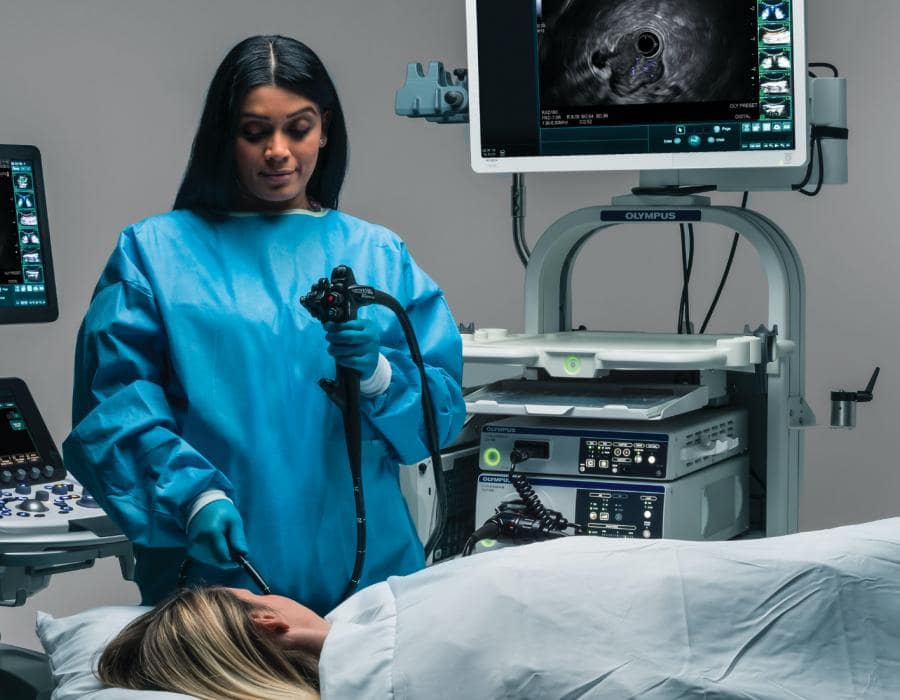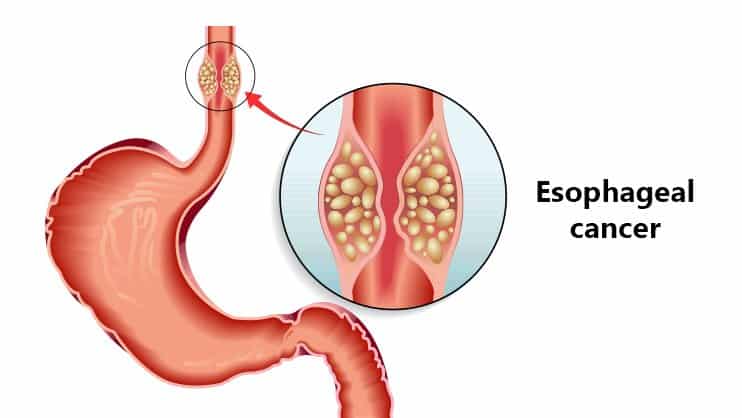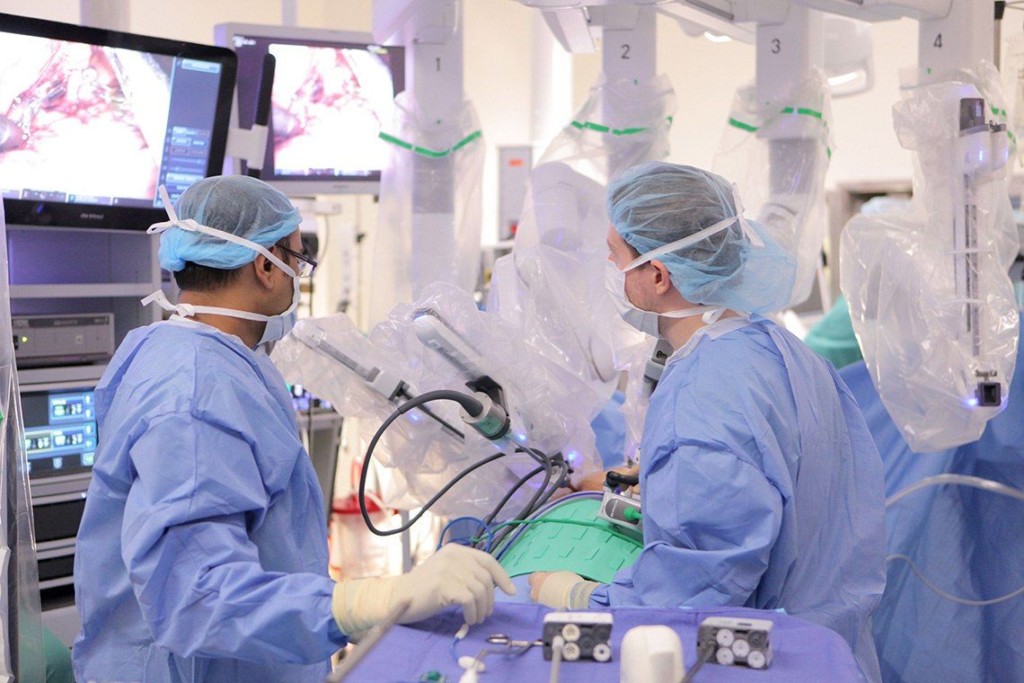Calls for Ukraine
Calls for Europe
Calls for USA

Esophageal cancer is a cancer in which malignant cells form in the tissues of the esophagus. The esophagus is a long, hollow tube from the pharynx to the stomach. It is necessary for the body to transport fluids and solids. Cancer cells most often appear in the lining of the esophagus. If not started early treatment, the tumor grows and affects other layers of the esophagus, surrounding tissues and gives life-threatening metastases.
There is no single cause of esophageal cancer. Doctors and scientists suggest that a tumor occurs when the genetic material inside the cells lining the esophagus is damaged. Disorders in the genetic material affect the division and renewal of cells in the esophagus. This is the cause of mutations and abnormal structure – cellular atypia.
Chronic cell damage is observed with prolonged irritation of the walls of the esophagus with certain substances. Doctors identify risk factors – the most common causes that increase the chances of developing esophageal cancer:
Some hereditary diseases can also cause the development of esophageal cancer, as they cause gene mutations in all cells of the body:
Esophageal cancer may be asymptomatic until it reaches later stages, in which the tumor is more difficult to treat. Patients most often complain of difficulty swallowing – dysphagia. This is due to the growth of a tumor that interferes with the normal passage of food from the pharynx to the stomach.
Over time, dysphagia may worsen, and the patient is forced to switch to softer and liquid foods, avoiding the meat and bakery products that cause the most discomfort. Changes in eating behavior are responsible for weight loss in the later stages of the disease.
As the tumor grows, the chance of bleeding increases. Because of this, patients may notice darkening of the stool. Prolonged blood loss leads to the development of anemia.
With cancer of the esophagus, other symptoms are observed:
How to recognize early esophageal cancer?
The symptoms of esophageal cancer are the same as for other non-oncological diseases of the gastrointestinal tract. If any signs appear, it is important to seek medical attention on time. Foreign clinics carry out diagnostics according to American and European treatment protocols. This ensures that the patient will complete all necessary examinations without waiting and queuing.

The symptoms of esophageal cancer are not unique and, in most cases, do not indicate the presence of cancer. Therefore, it is important to start the diagnosis with a consultation with a gastroenterologist. The doctor will study the medical history, patient complaints and conduct an initial examination. Based on the results of the consultation, the doctor will prescribe the necessary studies to clarify the diagnosis.
If doctors suspect esophageal cancer, the following diagnostic procedures can be prescribed:
The cost of endoscopy with biopsy in clinics around the world:
Life expectancy depends on a number of factors: the stage of the disease, concomitant health problems, the treatment carried out. Properly prescribed therapy improves the general condition of the patient and affects the prognosis of survival in esophageal cancer in general. In oncology, the concept of “five-year survival” is used, which reflects the life expectancy of patients at different stages of the disease. Also, the prognosis is influenced by the indicator of how quickly esophageal cancer develops.
If the tumor is limited to the esophagus and does not go beyond it, the 5-year survival rate is 47%. When cancer spreads beyond the esophagus to nearby tissues and lymph nodes, the survival rate is 25%. The five-year survival rate for metastasis of esophageal cancer beyond the chest is 5%.

The stage of esophageal cancer is determined by its size and its prevalence throughout the body. Determination of the stage is necessary for doctors to more effectively combine different methods of treatment. Despite the fact that each human body is unique, the prognosis and effectiveness of the prescribed therapy can be determined by the correctly established stage of the tumor.
The American Joint Committee for the Study of Cancer (AJCC) divides the stages of esophageal cancer according to several criteria:
The end stage of esophageal cancer is influenced by the structure of the tumor and the degree of maturity of the malignant cells. There are five stages in total:

Esophageal cancer is treated comprehensively. The choice of treatment tactics is influenced by the stage of the tumor, the general condition of the patient, the presence of concomitant diseases and previous treatment. Esophageal cancer is easier to treat early when the tumor has not spread outside the esophagus.
Surgical removal of the tumor is used both independently and in combination with other methods. In modern medical practice, the following methods are used:
Operations are performed by open and laparoscopic methods. In open surgery, the tumor is removed through several incisions in the neck, chest, or abdomen. The choice of surgical approach is based on the location of the tumor in the esophagus.
Laparoscopic removal is available for small tumors. The doctor performs the operation through several small punctures through which a laparoscope passes – a special device with a camera and surgical instruments.
How much does esophageal cancer surgery cost?
The cost of the operation is influenced by the complexity of the surgery, the doctor’s qualifications and the country in which the patient is being treated.
Examples of how much esophageal cancer surgery costs in foreign clinics:
Chemotherapy
A medical oncologist prescribes medications that kill cancer cells by acting on the body in a complex manner. The patient takes chemotherapy drugs in the form of tablets or intravenous solutions. Chemotherapy for esophageal cancer may be given before surgery to shrink the tumor. This type of chemotherapy is called neoadjuvant chemotherapy. Adjuvant chemotherapy is carried out after surgical removal of the tumor to avoid the spread of metastases throughout the body.
The dose and combination of drugs are selected by the doctor individually for each patient. In the later stages of the disease, chemotherapy is used as an independent treatment to reduce symptoms and improve the patient’s general condition.
Radiation therapy
The tumor is exposed to high-energy rays, which consist of X-rays or protons. The radiation comes from special devices – linear accelerators. In this case, it is external radiation therapy for esophageal cancer. In some situations, a radioactive drug is placed near the tumor. This type of radiation therapy is called brachytherapy. As with chemotherapy, the dose of radiation therapy is determined individually after careful diagnosis.
Targeted therapy
This is one of the modern methods of treating cancer. Targeted drugs, unlike chemotherapy, target tumor cells. Targeted therapy for esophageal cancer has strict indications and a number of limitations. Before the appointment, special tests are performed to determine genetic mutations and drug susceptibility.
Immunotherapy
Some drugs can affect a person’s own immune system and help it recognize tumor cells. Immunotherapy for esophageal cancer is used in the later stages or in case of relapse of the disease.
Modern technological equipment
Foreign clinics are equipped with new medical equipment, which makes the treatment of esophageal cancer more gentle for the patient’s body and effective in combating the disease. For radiation therapy, clinics in Turkey, Israel, Germany, Italy use the latest linear accelerators – Clinac iX, Varian TrueBeam STx, etc.
Operations are performed under the control of CT and ultrasound machines using three-dimensional reconstruction of the tumor and the surrounding vessels.
In the early stages of esophageal cancer, minimally invasive tumor removal using a Da Vinci robot is possible. This is a gentle operation with minimal damage to healthy tissue.
Teamwork of doctors
Treatment of esophageal cancer in foreign clinics is carried out under the supervision of an interdisciplinary team of doctors: surgeons, oncologists, radiotherapists, general practitioners. Every week, the doctor gathers for a consultation, where the current condition of the patient and the further treatment plan are discussed. This approach ensures that the patients are given the right treatment and that any changes in the state of the body during their stay in the clinic are paid attention to.
Quality medicines
The staff of foreign clinics carefully monitors the storage and use of drugs for the treatment of cancer. Before each chemotherapy, the patient can check the tightness and shelf life of the drug, read the documents. Some countries, such as Germany and Turkey, strictly control and prevent any counterfeits from entering pharmacies and clinics.
Current treatment protocols
In foreign hospitals, patients with cancer are treated according to the modern protocols of the World Health Organization. Treatment protocols are drawn up by leading specialists, they are tested in the course of many years of international research.
Esophageal cancer treatment in Turkey, Israel and Europe is most effective because clinics in these countries do not deviate from medical standards. Doctors of foreign oncological hospitals can complement treatment, but not exclude important stages of therapy from the schemes.
Rapid diagnosis of esophageal cancer abroad
Foreign medical centers and oncology departments are aimed at admitting a large number of patients from all over the world. Medical equipment and laboratory are available at any time of the day, including weekends. The average duration of diagnosis of esophageal cancer in a foreign clinic is 3-5 days from the moment the patient is admitted to the hospital.
The total cost of diagnostics and treatment of esophageal cancer abroad depends on several factors:
How much does it cost to diagnose and treat esophageal cancer in Israel, Germany and other countries
Comprehensive diagnostics:
Immunotherapy
In clinics in Turkey, Germany, Israel and several other countries, the cost of immunotherapy drugs will be the same. The price may differ depending on the drug itself (the manufacturer and the active ingredient in the composition).
The cost of immunotherapy will average from $1 250 to $2 500.
Targeted therapy
The cost of original drugs is the same, regardless of the clinic and country. The final cost of treatment with targeted drugs in Turkey, Israel, Germany, Spain and other countries is determined by the additional services of a medical institution: accommodation, meals, care, procedures.
The price of drugs ranges from $1 200 to $3 000.
The cost of surgery for esophageal cancer abroad
Esophagectomy (removal of part of the esophagus):
Self-treatment of esophageal cancer leads to life-threatening conditions. If you experience any symptoms, you should see a doctor immediately. Treatment with alternative methods often leads to tumor progression and death.
Often, patients with esophageal cancer complain of difficulty swallowing and chewing food. If esophageal cancer is diagnosed, only a doctor determines what can be eaten. Doctors recommend chopping food in a blender or food processor to avoid foods that are hard or hard to taste.
Also, the patient may be concerned about dry mouth. In this case, a diet with an abundance of juicy and soft foods is recommended. Gravy, mashed potatoes, and sauces are added to ordinary dishes.
During the period of receiving radiation or chemotherapy, it is recommended to consume food rich in proteins. This is due to a decrease in appetite and a decrease in the amount of food consumed.
When choosing a foreign clinic, it is important to pay attention to the following factors:
Most often, patients choose clinics in Turkey, Germany, Israel, South Korea and Spain for esophageal cancer treatment.
Self-treatment of esophageal cancer leads to life-threatening conditions. If you experience any symptoms, you should see a doctor immediately. Treatment with alternative methods often leads to tumor progression and death.
Often, patients with esophageal cancer complain of difficulty swallowing and chewing food. If esophageal cancer is diagnosed, only a doctor determines what can be eaten. Doctors recommend chopping food in a blender or food processor to avoid foods that are hard or hard to taste.
Also, the patient may be concerned about dry mouth. In this case, a diet with an abundance of juicy and soft foods is recommended. Gravy, mashed potatoes, and sauces are added to ordinary dishes.
During the period of receiving radiation or chemotherapy, it is recommended to consume food rich in proteins. This is due to a decrease in appetite and a decrease in the amount of food consumed.
When choosing a foreign clinic, it is important to pay attention to the following factors:
Most often, patients choose clinics in Turkey, Germany, Israel, South Korea and Spain for esophageal cancer treatment.
Please rate the work of MedTour
